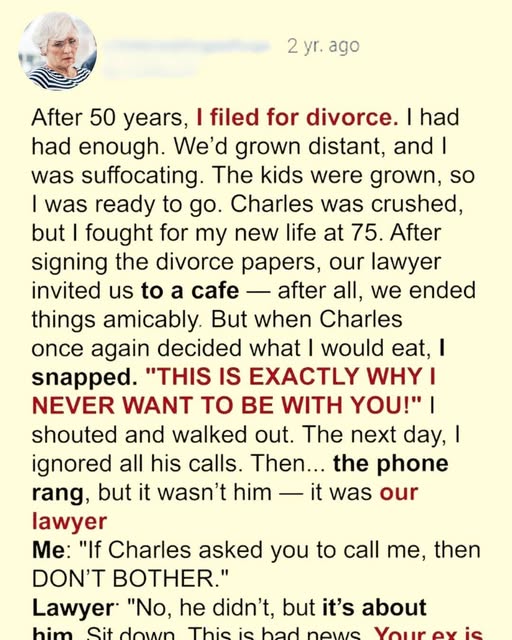After fifty years of marriage, I never imagined I would be the one asking for an ending. At seventy-five, most people cling tightly to whatever time they have left. But I kept arriving at the same truth: I wanted out. Not because Charles had hurt me. Not because he had become someone different. But because something inside me had shifted in a way I could no longer ignore. Somewhere between raising children, looking after aging parents, keeping a home together, and smoothing every wrinkle in our lives, I had lost myself. I wasn’t me anymore—I had become a shadow of our routine, an extension of his calm, a role that once made me feel safe but had slowly turned into a room without windows.
We married young. He was kind, patient, steady—and everyone told me I was lucky. For decades, I believed them. Our life looked perfect from the outside: a warm home, family traditions, shared humor, Sunday dinners, anniversaries marked with handwritten notes. But in the quiet years after retirement, everything shifted. While he settled comfortably into routine, I began to feel trapped. The silence in the house pressed on me. And the love that had grounded me for so long began to feel like a cage I had unknowingly built around myself.
Arguments began over the smallest things. I snapped easily, withdrew quickly, grew frustrated without being able to explain why. He kept asking what was wrong; I had no real answer. I only knew there was a growing knot of anger and emptiness inside me that I didn’t know how to untangle.
One afternoon, after countless sleepless nights and spiraling thoughts, I told him I wanted a divorce.
He didn’t shout. He didn’t beg. He just looked at me with the same soft eyes I had once fallen in love with, and said, “If freedom is what you need, I won’t stop you.”
It should have made things easier. Instead, his calm shattered something inside me.
We signed the papers quietly, like two people closing a contract rather than unraveling half a century of life together. The lawyer, in an awkward attempt at kindness, suggested we share one last dinner “for old times’ sake.”
We went—maybe out of habit, maybe because neither of us knew what else to do.
The restaurant was dim, but Charles lowered the lights even further as we sat down. “For your eyes,” he said gently. “They’ve been bothering you lately.”
But my heart was hard, and instead of seeing a small kindness, I saw control—one more moment of him deciding something for me, even in the final hours of our marriage.
I exploded. Harsh words came spilling out—old frustrations, buried hurts, accusations neither of us deserved. His face didn’t twist with anger. It collapsed with sadness. I didn’t care. I grabbed my coat, left him sitting alone under the soft glow of the lights, and convinced myself it was the first step toward the freedom I had been craving.
He called me later—three times. I ignored every call. I assumed he wanted to talk me into staying. I refused to go back.
By morning, everything had changed.
A neighbor called with a trembling voice. Charles had suffered a heart attack. Paramedics managed to revive him, just barely. He was rushed to the hospital in critical condition.
My entire world fell silent.
I drove to the house in a fog, but when I opened the door I didn’t find him—I found an envelope on the kitchen table with my name written in his familiar handwriting.
I sat down before my legs gave out and opened it with shaking hands.
“I have loved you in every season of our life. I dimmed the lights for your comfort, not control. I learned your habits not to guide you but to care for you. You say you want freedom, and I understand. But I want you to know that every choice I made was to ease your days, never to confine you.”
I don’t remember dropping the letter—only the sound it made when it hit the tile.
When I reached the hospital, he was pale, covered in wires and machines. I took his hand with a desperation that cut through my chest.
“I’m sorry,” I whispered. “I didn’t see you. I didn’t see your love. I thought I was suffocating because of you, but you were trying to shelter me, not trap me. Please forgive me. Please don’t leave.”
He stirred, opening his eyes just long enough to squeeze my hand. It wasn’t strength—it was recognition, one last offering of the love he had never stopped giving.
In that moment, the truth hit me: the freedom I had spent months chasing wasn’t out there somewhere. It had always been in the quiet way he loved me. I hadn’t been suffocating because of him—I had been drowning in my own regrets and unspoken fears.
He had never wanted perfection. He only wanted to be truly seen. And I had failed to do that until the moment I almost lost him.
He survived the night, though barely. The recovery ahead was uncertain. But I stayed. And I won’t leave again.
Fifty years of marriage taught me many things, but almost losing him taught me the most important one: love is not confinement. Love is the gentle lowering of a light, the small gestures that go unnoticed until they’re gone, the quiet care that holds a life together.
Whatever time we have left—be it years or only days—I will spend it seeing him clearly, loving him intentionally, and choosing him with the same devotion he chose me with for half a century.
Freedom was never something I had to find. It was something I needed to understand.
